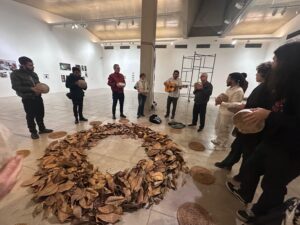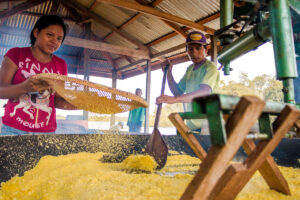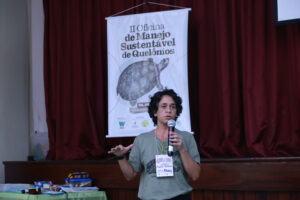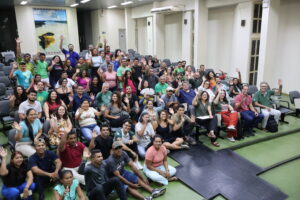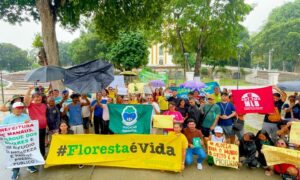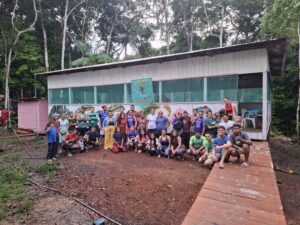On this National Education Day, we want to draw attention to the importance of ensuring this right in the territories, as a tool of emancipation, autonomy and self-determination of their populations.
By: Marcos Cunha, São Raimundo community, Carauari/AM – Pedagogue and Master’s Student in Social Anthropology by UFAM
Maria Phamela Barbosa, Manaus/AM – Biologist and Socio-environmental Educator at the Instituto Juruá
Rodrigo Carmino, Roque community, Carauari/AM – Pedagogue
Quilvilene Cunha, São Raimundo community, Carauari/AM – Pedagogue and Projects Coordinator at ASPROC
Education is an issue that sparks tensions and concern across Brazil every year. According to the latest census (2022) published by the Brazilian Institute of Geography and Statistics (IBGE), the Northern region of the country ranks lowest in terms of educational performance. The reasons are diverse, from difficulties in accessing some areas to a lack of professionals and adequate infrastructure. In addition to a range of logistical, socioeconomic and ethnic-racial challenges, Amazonian populations have to deal with the consequences and combat the State’s neglect in the omission of their rights to Education. Furthermore, the censuses also emphasize the ethnic-racial inequalities in access to education in the Amazon region.
At the beginning of this year, the country was able to witness the rise of the indigenous movement in the successful attempt to reverse the approval of the project by the Governor of Pará, Helder Barbalho, to hollow out in-person education in remote communities. Law 10.820/24 would allow distance education in villages. Everything we still face today is nothing more than a reflection of the colonial history of Amazon and the lack of specific public policies that guarantee the rights of peripheral populations, whether urban, rural or riverside.
Focusing on the reality of Médio Juruá region, despite being a model territory of struggle, achievements and social movement organization, there are still many kilometers of river to be travelled in terms of education. On this Nacional Education Day, we want to highlight the importance of guaranteeing this right at the territories, as a tool for emancipation, autonomy and self-determination of their populations.
School is much more than an instrument of schooling, based on this colonizing ideia of encoding and decoding letters and numbers, following a technocratic tendency to produce labor for capital. In its educational process, school must be an instrument to strengthen the individual as a social being in alignment with their culture. From this perspective, it is important to reflect on what this school is like in Caruari-AM and how this educational process takes place there.
It is relevant to mention that we have visible advancements in this context, directly linked to the administrators’ willpower. Nevertheless, it is possible to observe that this education is thought to comply with the educational system, as seen in the three stages, and serves as preparation for achieving goals tied to an established average, such as SAEB test, with knowledge being measured though multiple-choice test, following the rules of capital which regards the school as being the only space for learning.
Education continues to be reproduced following this educational system, which is much more focused on teaching, the transmission of content, than on learning, which is the exchange of knowledge through dialogue. It is necessary to be vigilant, because this model ends up becoming colonialist, as it is conceived from top to bottom, without considering the reality of the individuals, not empowering their territories, knowledge, culture, traditions and beliefs, presenting the outsider as the superior, as if being rubber tapper, farmer, fisher, or seed collector were something negative that they need to learn to avoid, in order to be something different and not like their parents.
Education whether in urban or rural settings must embrace the perspective that knowledge is not merely absorbed, but rather socialized, co-constructed, and shared. It requires recognizing that every space generates knowledge, and that this learning process must be thoughtfully designed and built with the participants themselves. An education conceived and created with and for them—one that strengthens and amplifies the social and cultural identity of their territories—so they may gain clarity on how to occupy, organize, and thrive within their own realities.
Challenges and Paths to a Necessary Transformation
The Médio Juruá region, in the heart of Amazon, faces unique educational realities, shaped by its isolated geography, sociocultural diversity and often precarious socioeconomic conditions. Teachers often work under temporary contracts or without adequate education to address local specificities. Young people have limited access to secondary and higher education and many of them have to abandon their studies to contribute to the family livelihood – whether through farming, extractivism, or fishing. This situation reflects a common scenario across much of rural Amazon: abandonment by public authorities, neglected cultural richness, and a lack of investments that guarantee dignified education. However, the education in the Médio Juruá goes far beyond the classroom. It is a tool of resistance, a bridge to sustainable development and a guardian of ancestral knowledge. When contextualized, it helps preserve indigenous and riverside knowledge about forest medicine, sustainable resource management and traditional agriculture. It is not only about passing on knowledge, but about strengthening community identity and opening paths toward a future with greater autonomy.
The education worked in our territory is still based on the colonizer’s perspective for the “colonized”. The few didactic materials that arrive at schools are decontextualized and outdated. Normally, they come from publishers in São Paulo with a completely urban reality. This does not mean that knowing other realities is not important, but it must comply with the new LDB law, which states that 60% of the knowledge should be universal and 40% from the reality of the individuals.
It is necessary to include in the educational curricular components rooted in the very foundation of the school; studying its own territory, its origins, cultural identity, ancestral knowledge, etc. When we talk about a contextualized education that aligns with the identity of the individuals, it is not only changing the letters of the alphabet and certain concepts to fit cultural language. It is about an emancipatory, autonomous education that nurtures critical-reflective individuals in their reality, with the capacity to seek changes/alternatives in order to ensure a life with social justice in the place where they live and produce their existence.
Education is a right for all (Article 205 of the Federal Constitution), and when it is carried out in a non-domesticating way, it is the greatest tool for social change, the transformation of realities for the liberation from the hardships imposed by the capitalist system that oppresses, manipulates and kills by denying rights. However, the obstacles are many:
- Of the teachers working in the network, most are from the city, with very little interest in researching and familiarizing themselves with the history and identity of the communities along the Juruá River;
- Lack of specific teacher training in the area;
- Lack of teaching resources;
- Lack of contextualized pedagogical materials;
- Lack of a municipal law that limits the number of classes in multi-grade classrooms;
- Almost 100% industrialized school meals;
- Some school structures are precarious and incompatible with the reality (e.g., brick schools, all closed, without fans);
- Rigid curricula that ignore the local reality;
- Difficulty in retaining teachers in the region.
We then ask ourselves: How can we maintain students’ interest if what is taught seems distant from their lives? Despite the challenges, there is hope. It is possible to transform education in the Médio Juruá, as long as there are effective public policies, investment in specific teacher education and, most importantly, listening to the communities. Some urgent changes and perspectives include:
- Dignified schools: with solar energy, clean water, bathrooms, and libraries;
- Teacher training: ongoing professional development in intercultural education and active methodologies;
- Pedagogical autonomy: school calendars adapted to natural cycles and community participation in the construction of the educational process;
- Establish a law that prohibits more than three grades/years in the same classroom (multi-grade class format);
- Ensure local food sovereignty in schools, with regionally sourced school meals;
- The entire community involved in school life.
Without organized pressure, education in this region will continue to be an exclusionary system that fails to engage with the Amazonian reality. We need to advocate for legislation that ensures the issues raised as perspectives will, in fact, become reality. Considering that all communities follow a multi-grade school/class format, an educational structure in which students from different grades study together in the same classroom under a single teacher. Although there is often a negative view of this teaching category, it is the only way to ensure access to schooling in remote, isolated areas with low population density. In this sense, it is important to notice that multi-grade education is not inherently negative, but it needs to be redefined. It is necessary to move away from a grading model rooted in a banking, alienating, and filtering approach to education,one that primarily functions to produce puppets to serve the interests of the wealthy. And to rethink the multi-grade school, by working with generative themes, interdisciplinarity, and pedagogical practices grounded in Freirean principles, in which Rural Education is based on pedagogies such as: the pedagogy of the oppressed, of autonomy, of liberation, and those emerging from social movements, like the pedagogy of ancestrality, land, and traditional knowledge.
With true unity between social movements, local leadership, and committed institutions, the Médio Juruá can become an example of how truly transformative education happens: rooted in the land, guided by the people’s voice and committed to the future of the forest and those who live in it.
References:

